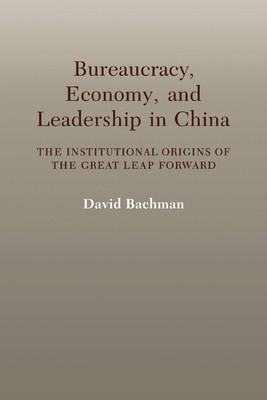
- We will send in 10–14 business days.
- Author: David Bachman
- Publisher: Cambridge University Press
- Year: 2006
- Pages: 288
- ISBN-10: 0521032334
- ISBN-13: 9780521032339
- Format: 15.2 x 22.9 x 1.7 cm, minkšti viršeliai
- Language: English
- SAVE -10% with code: EXTRA
Reviews
Description
In this book David Bachman examines the origins of the Great Leap Forward (GLF), a program of economic reform that must be considered one of the great tragedies of Communist China, estimated to have caused the death of between 14 and 28 million Chinese. While standard accounts interpret the GLF as chiefly the brainchild of Mao Zedong and as a radical rejection of a set of more moderate reform proposals put forward in the period 1956 to 1957, Bachman proposes a provocative reinterpretation of the origins of the GLF that stresses the role of the bureaucracy. Using a neo-institutionalist approach to analyze economic policy-making leading up to the GLF, he argues that the GLF must be seen as the product of an institutional process of policy-making.
EXTRA 10 % discount with code: EXTRA
The promotion ends in 21d.17:38:22
The discount code is valid when purchasing from 10 €. Discounts do not stack.
- Author: David Bachman
- Publisher: Cambridge University Press
- Year: 2006
- Pages: 288
- ISBN-10: 0521032334
- ISBN-13: 9780521032339
- Format: 15.2 x 22.9 x 1.7 cm, minkšti viršeliai
- Language: English English
In this book David Bachman examines the origins of the Great Leap Forward (GLF), a program of economic reform that must be considered one of the great tragedies of Communist China, estimated to have caused the death of between 14 and 28 million Chinese. While standard accounts interpret the GLF as chiefly the brainchild of Mao Zedong and as a radical rejection of a set of more moderate reform proposals put forward in the period 1956 to 1957, Bachman proposes a provocative reinterpretation of the origins of the GLF that stresses the role of the bureaucracy. Using a neo-institutionalist approach to analyze economic policy-making leading up to the GLF, he argues that the GLF must be seen as the product of an institutional process of policy-making.


Reviews